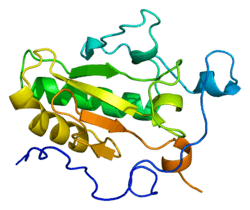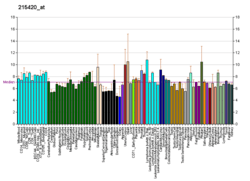IHH (protein)
Indian hedgehog homolog (Drosophila), also known as IHH, is a protein which in humans is encoded by the IHH gene.[5][6][7] This cell signaling protein is in the hedgehog signaling pathway. The several mammalian variants of the Drosophila hedgehog gene (which was the first named) have been named after the various species of hedgehog; the Indian hedgehog is honored by this one. The gene is not specific to Indian hedgehogs.
Function
The Indian hedgehog protein is one of three proteins in the mammalian hedgehog family, the others being desert hedgehog (DHH) and sonic hedgehog (SHH).[8] It is involved in chondrocyte differentiation, proliferation and maturation especially during endochondral ossification. It regulates its effects by feedback control of parathyroid hormone-related peptide (PTHrP).[9]
References
- 1 2 3 GRCh38: Ensembl release 89: ENSG00000163501 - Ensembl, May 2017
- 1 2 3 GRCm38: Ensembl release 89: ENSMUSG00000006538 - Ensembl, May 2017
- ↑ "Human PubMed Reference:".
- ↑ "Mouse PubMed Reference:".
- ↑ "Entrez Gene: IHH Indian hedgehog homolog (Drosophila)".
- ↑ Marigo V, Roberts DJ, Lee SM, Tsukurov O, Levi T, Gastier JM, Epstein DJ, Gilbert DJ, Copeland NG, Seidman CE (July 1995). "Cloning, expression, and chromosomal location of SHH and IHH: two human homologues of the Drosophila segment polarity gene hedgehog". Genomics. 28 (1): 44–51. PMID 7590746. doi:10.1006/geno.1995.1104.
- ↑ van den Brink GR, Bleuming SA, Hardwick JC, Schepman BL, Offerhaus GJ, Keller JJ, Nielsen C, Gaffield W, van Deventer SJ, Roberts DJ, Peppelenbosch MP (March 2004). "Indian Hedgehog is an antagonist of Wnt signaling in colonic epithelial cell differentiation". Nat. Genet. 36 (3): 277–82. PMID 14770182. doi:10.1038/ng1304.
- ↑ Kumar S, Balczarek KA, Lai ZC (March 1996). "Evolution of the hedgehog gene family". Genetics. 142 (3): 965–72. PMC 1207033
 . PMID 8849902.
. PMID 8849902. - ↑ Vortkamp A, Lee K, Lanske B, Segre GV, Kronenberg HM, Tabin CJ (August 1996). "Regulation of rate of cartilage differentiation by Indian hedgehog and PTH-related protein". Science. 273 (5275): 613–22. PMID 8662546. doi:10.1126/science.273.5275.613.
Further reading
- St-Jacques B, Hammerschmidt M, McMahon AP (August 1999). "Indian hedgehog signaling regulates proliferation and differentiation of chondrocytes and is essential for bone formation". Genes Dev. 13 (16): 2072–86. PMC 316949
 . PMID 10465785. doi:10.1101/gad.13.16.2072.
. PMID 10465785. doi:10.1101/gad.13.16.2072. - Karp SJ, Schipani E, St-Jacques B, Hunzelman J, Kronenberg H, McMahon AP (February 2000). "Indian hedgehog coordinates endochondral bone growth and morphogenesis via parathyroid hormone related-protein-dependent and -independent pathways". Development. 127 (3): 543–8. PMID 10631175.
- Minina E, Wenzel HM, Kreschel C, Karp S, Gaffield W, McMahon AP, Vortkamp A (November 2001). "BMP and Ihh/PTHrP signaling interact to coordinate chondrocyte proliferation and differentiation". Development. 128 (22): 4523–34. PMID 11714677.
- Vortkamp A, Lee K, Lanske B, Segre GV, Kronenberg HM, Tabin CJ (August 1996). "Regulation of rate of cartilage differentiation by Indian hedgehog and PTH-related protein". Science. 273 (5275): 613–22. PMID 8662546. doi:10.1126/science.273.5275.613.
- Zhang D, Schwarz EM, Rosier RN, Zuscik MJ, Puzas JE, O'Keefe RJ (September 2003). "ALK2 functions as a BMP type I receptor and induces Indian hedgehog in chondrocytes during skeletal development". J. Bone Miner. Res. 18 (9): 1593–604. PMID 12968668. doi:10.1359/jbmr.2003.18.9.1593.
- Long F, Zhang XM, Karp S, Yang Y, McMahon AP (December 2001). "Genetic manipulation of hedgehog signaling in the endochondral skeleton reveals a direct role in the regulation of chondrocyte proliferation". Development. 128 (24): 5099–108. PMID 11748145.
- Marigo V, Roberts DJ, Lee SM, et al. (1995). "Cloning, expression, and chromosomal location of SHH and IHH: two human homologues of the Drosophila segment polarity gene hedgehog.". Genomics. 28 (1): 44–51. PMID 7590746. doi:10.1006/geno.1995.1104.
- Chang DT, López A, von Kessler DP, et al. (1995). "Products, genetic linkage and limb patterning activity of a murine hedgehog gene.". Development. 120 (11): 3339–53. PMID 7720571.
- Porter JA, Young KE, Beachy PA (1996). "Cholesterol modification of hedgehog signaling proteins in animal development.". Science. 274 (5285): 255–9. PMID 8824192. doi:10.1126/science.274.5285.255.
- Leek JP, Moynihan TP, Anwar R, et al. (1997). "Assignment of Indian hedgehog (IHH) to human chromosome bands 2q33→q35 by in situ hybridization.". Cytogenet. Cell Genet. 76 (3-4): 187–8. PMID 9186520. doi:10.1159/000134545.
- Pepinsky RB, Zeng C, Wen D, et al. (1998). "Identification of a palmitic acid-modified form of human Sonic hedgehog.". J. Biol. Chem. 273 (22): 14037–45. PMID 9593755. doi:10.1074/jbc.273.22.14037.
- Carpenter D, Stone DM, Brush J, et al. (1998). "Characterization of two patched receptors for the vertebrate hedgehog protein family.". Proc. Natl. Acad. Sci. U.S.A. 95 (23): 13630–4. PMC 24870
 . PMID 9811851. doi:10.1073/pnas.95.23.13630.
. PMID 9811851. doi:10.1073/pnas.95.23.13630. - Chuang PT, McMahon AP (1999). "Vertebrate Hedgehog signalling modulated by induction of a Hedgehog-binding protein.". Nature. 397 (6720): 617–21. PMID 10050855. doi:10.1038/17611.
- Ito H, Akiyama H, Shigeno C, et al. (1999). "Hedgehog signaling molecules in bone marrow cells at the initial stage of fracture repair.". Biochem. Biophys. Res. Commun. 262 (2): 443–51. PMID 10462495. doi:10.1006/bbrc.1999.1197.
- Bak M, Hansen C, Friis Henriksen K, Tommerup N (2001). "The human hedgehog-interacting protein gene: structure and chromosome mapping to 4q31.21→q31.3.". Cytogenet. Cell Genet. 92 (3-4): 300–3. PMID 11435703. doi:10.1159/000056918.
- Gao B, Guo J, She C, et al. (2001). "Mutations in IHH, encoding Indian hedgehog, cause brachydactyly type A-1.". Nat. Genet. 28 (4): 386–8. PMID 11455389. doi:10.1038/ng577.
- Gritli-Linde A, Lewis P, McMahon AP, Linde A (2001). "The whereabouts of a morphogen: direct evidence for short- and graded long-range activity of hedgehog signaling peptides.". Dev. Biol. 236 (2): 364–86. PMID 11476578. doi:10.1006/dbio.2001.0336.
- Kindblom JM, Nilsson O, Hurme T, et al. (2002). "Expression and localization of Indian hedgehog (Ihh) and parathyroid hormone related protein (PTHrP) in the human growth plate during pubertal development.". J. Endocrinol. 174 (2): R1–6. PMID 12176676. doi:10.1677/joe.0.174R001.
- Cormier S, Delezoide AL, Benoist-Lasselin C, et al. (2002). "Parathyroid hormone receptor type 1/Indian hedgehog expression is preserved in the growth plate of human fetuses affected with fibroblast growth factor receptor type 3 activating mutations.". Am. J. Pathol. 161 (4): 1325–35. PMC 1867304
 . PMID 12368206. doi:10.1016/s0002-9440(10)64409-4.
. PMID 12368206. doi:10.1016/s0002-9440(10)64409-4. - McCready ME, Sweeney E, Fryer AE, et al. (2002). "A novel mutation in the IHH gene causes brachydactyly type A1: a 95-year-old mystery resolved.". Hum. Genet. 111 (4-5): 368–75. PMID 12384778. doi:10.1007/s00439-002-0815-2.
- Strausberg RL, Feingold EA, Grouse LH, et al. (2003). "Generation and initial analysis of more than 15,000 full-length human and mouse cDNA sequences.". Proc. Natl. Acad. Sci. U.S.A. 99 (26): 16899–903. PMC 139241
 . PMID 12477932. doi:10.1073/pnas.242603899.
. PMID 12477932. doi:10.1073/pnas.242603899. - Kirkpatrick TJ, Au KS, Mastrobattista JM, et al. (2003). "Identification of a mutation in the Indian Hedgehog (IHH) gene causing brachydactyly type A1 and evidence for a third locus.". J. Med. Genet. 40 (1): 42–4. PMC 1735266
 . PMID 12525541. doi:10.1136/jmg.40.1.42.
. PMID 12525541. doi:10.1136/jmg.40.1.42. - Hellemans J, Coucke PJ, Giedion A, et al. (2003). "Homozygous mutations in IHH cause acrocapitofemoral dysplasia, an autosomal recessive disorder with cone-shaped epiphyses in hands and hips.". Am. J. Hum. Genet. 72 (4): 1040–6. PMC 1180335
 . PMID 12632327. doi:10.1086/374318.
. PMID 12632327. doi:10.1086/374318. - Niemann C, Unden AB, Lyle S, et al. (2003). "Indian hedgehog and beta-catenin signaling: role in the sebaceous lineage of normal and neoplastic mammalian epidermis.". Proc. Natl. Acad. Sci. U.S.A. 100 Suppl 1: 11873–80. PMC 304101
 . PMID 12917489. doi:10.1073/pnas.1834202100.
. PMID 12917489. doi:10.1073/pnas.1834202100. - Berman DM, Karhadkar SS, Maitra A, et al. (2003). "Widespread requirement for Hedgehog ligand stimulation in growth of digestive tract tumours.". Nature. 425 (6960): 846–51. PMID 14520411. doi:10.1038/nature01972.
- Garcia-Barceló MM, Lee WS, Sham MH, et al. (2004). "Is there a role for the IHH gene in Hirschsprung's disease?". Neurogastroenterol. Motil. 15 (6): 663–8. PMID 14651602. doi:10.1046/j.1350-1925.2003.00447.x.






